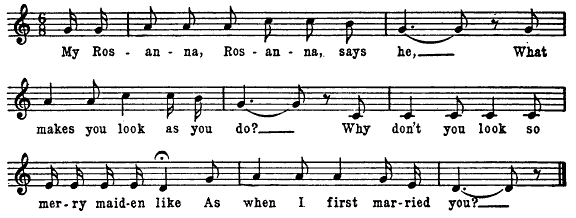Rosanna- Marsh/Hubbard (Utah) c.1865 JOAFL
[From: Traditional Ballads from Utah by Lester A. Hubbard and LeRoy J. Robertson; The Journal of American Folklore, Vol. 64, No. 251 (Jan. - Mar., 1951), pp. 37-53. Their notes follow.
R. Matteson 2012, 2014]
4. "Fair Annie" (Child No. 62)
"Rosanna." Communicated by Mrs. Salley A. Hubbard, February 6, 1946, and sung for recording July 10, I947. Her father, George J. Marsh, who learned it while he was a Mormon missionary in Leeds, England, in 1865 and frequently sang it after he returned to Utah. For texts and references see Combs, pp. 129-I33; Gavin Grieg and Alexander Keith, Last Leaves of Traditional Ballads and Ballad Airs (Aberdeen, 1925), pp. 47-50; Cecil J. Sharp, English Folk Songs from the Southern Appalachians, ed. by Maud Karpeles (London, 1932), I, 95-96, 415.

My Rosanna, Rosanna, says he,
What makes you look as you do?
Why don't you look so merry maiden like
As when I first married you.
"How can I look merry maidenlike
When a maiden I am none?
Seven sons I've borne unto thee
And all my fresh colors gone."
"Who'll bake my bread," he says,
"And who'll brew my ale?
And who will welcome the gay lady home
That I bring across the main?"
"I'll bake your bread," she says,
"And I'll brew your ale,
But I'll not welcome the gay lady home
That you bring across the main."
She took the spyglass in her hand
And wandered up and down.
Who could she see but her own husband dear
With his young bride bringing home?
She called to her seven sons
By one, two and three,
And she said unto the eldest one,
"I can see what you can see."
He took the spyglass in his hand
And wandered up and down,
And who could he see but his own father dear
With his young bride coming home?
"Shall I dress in green," she says,
"Or shall I dress in black?
Or shall I go down to the raging main
And send my soul to wrack?"
"You needn't dress in green," he says.
"You needn't dress in black,
But open all of your doors wide
And welcome my father back."
"You are welcome home, King Henry," she says,
"You're welcome to what's your own,
Likewise all your weary servant men
That along with you have come."
"Rosanna, Rosanna, Rosanna," says he,
Now welcome the gay lady home,
. . . . .
And rewarded you shall be."
"You're welcome home, gay lady," she says,
"You're welcome to what's your own,
Likewise all your weary servant maids
That along with you have come."
She treated them round with the best of wine;
She treated them round and round,
But she drank herself of the cold well water
To keep her courage down.
And supper being made ready
And all things over with
Rosanna went down to the lower cellar room
All alone in silence to weep.
"Rosanna, Rosanna, Rosanna," says she,
"What makes you weep so loud?
Your hogshead hoops are all a-bursting off
And your wine is a-running out.
"I will get up and you shall lie down,
For this bed it is your own;
For a maid I've come and a maid I'll stay
And a maid I will go home.
"Have you any father dear,
Or have you any mother?
Or have you any sister dear,
Or have you any brother?"
"King Henry is my own father dear,
Queen Esther she's my mother,
Liddie Margaret is my own sister dear
And Lord Arnold he's my brother."
"If King Henry is your own father dear
And Queen Esther is your mother,
I'm sure I'm your sister Margaret,
For Lord Arnold he's my brother.
"Seven ships I have at sea,
These seven they are my own.
Five of them I'll give unto thee
And two shall carry me home."